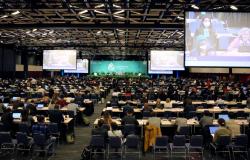On thin ice: The Post-2020 Global Biodiversity Framework negotiations at COP15

As the 15th Conference of the Parties (COP15) to the Convention on Biological Diversity (CBD) passed its halfway mark, hope and perseverance prevailed. On Thursday 15 December, the High-Level Segment started. The High-Level Segment, which ran until 17 December, is a critical phase in the negotiations. What comes out will determine the global biodiversity framework and the future for the planet and people.
The negotiations enter critical phase
COP15 must deliver a landmark agreement, one that fosters a new vision for nature and facilitates the implementation of ambitious and coordinated action on biodiversity at scale. The strategies and approaches that have been advanced in past have not worked. This COP must not repeat, or merely tweak, what has been tried and hope for a different outcome. A Nature editorial from 2020, the year COP15 was supposed to take place if it weren’t to the COVID-19 pandemic, is a reminder of the lessons learned from the meager progress made on the Aichi Targets.
With the opening of the High-Level Segment, the negotiations have entered the final stage. The ministers of environment are tasked with going over the draft, removing all the brackets and agreeing on the final text of the biodiversity framework.
Many would be baffled to see so many square brackets in the draft text, which is available on the CBD website. At the start of the GBF, the text contained about 900 brackets and ballooned to over 1400, as explained in an COP15 update by Bethan Laughlin, Senior Policy Specialist at ZSL. With multiple brackets within a sentence, it is possible see the different formulations on a given section of the draft that are being tabled. This is not uncommon in UN negotiations. Words do matter. How strongly or moderately worded the text is will have enormous effect that will last long after the negotiations are over. For example, the difference between “halting” and “reversing” matters.
Recent days have been tense at the Palais des Congrès, the COP15 venue. Negotiators from developing countries walked out because of low ambition on finance. It is not enough to set targets and goals without strong finance and resource mobilization. The means of implementations have to be there, this is where the disagreements arise.
The whole of society
All eyes are on the target to protect and conserve 30% of land and ocean worldwide by 2030, known as 30x30. This target is often likened to the goal of limiting global temperature rise to 1.5 C central to the Paris Agreement on climate change.
Protected areas will be needed and have an important place. Yet, overemphasizing a single target would miss an important point. Single formulas are not the answer for biodiversity. The targets being considered for the global framework are complementary and interlinked.
The same goes for the implementation of the biodiversity framework once an agreement is reached. The changes needed to reverse biodiversity loss need ambitious, effective, and credible commitments from all actors. This is why a group of experts on climate action and on biodiversity have recently released a correspondence article in the journal Nature Ecology & Evolution. The article co-authored by 25 specialists led by Sander Chan, Assistant Professor at Radboud University, and Nathalie Pettorelli, Professor at Zoological Society of London (ZSL) calls for a robust biodiversity action agenda that mobilizes actions for biodiversity from across the society.
If a global framework is to mobilize the whole of society, Target 15 is critical for its success. This target is about the responsibilities of businesses. It provides an important opportunity for businesses to scale up and accelerate action for biodiversity. A crucial component of the draft text is the clause on mandatory monitoring, assessing, and disclosing the risks to biodiversity by businesses. Assessing their own impacts and dependence on nature is where most of the impactful action can take place. This is why Business for Nature, a global coalition that brings together business and conservation organizations and forward-thinking companies to amplify a credible business voice for nature, is calling for an ambitious Target 15. In a position statement Business for Nature is asking for mandatory requirements for large business and financial organizations to assess and disclose dependencies on biodiversity. In the draft text being negotiated, the mandatory clause remains in brackets and divides countries, a sticking point being whether the mandatory disclosure should include supply chains and value chains.
Closely related and as consequential are two targets: Targets 18 and 19. The former is about eliminating subsidies harmful to biodiversity and the latter on financial mobilization. These targets, provided that they make it to the final text in strong terms, can work in symbiosis with one another and with Target 15 in the implementation of the biodiversity framework.
The takeaway
The negotiations are on thin ice. The mood at the Palais des Congres is understandably stern but unabashedly hopeful. No one knows what the next days at COP15 will bring. This is a historic opportunity and a critical juncture. “We have a choice to step back from the precipice and make this work”, said UN Deputy Secretary General Amina J. Mohammed at a media question & answer session on 15 December. Much remains to be seen in the next few days.
Idil Boran is professor of applied environmental governance and faculty fellow at the Dahdaleh Institute for Global Health Research at York University, in Toronto, Canada. At York University. Professor Boran serves as Associate Director of CIFAL York, a leadership training centre affiliated with the United Nations Institute for Training and Research (UNITAR). She also holds an external affiliation as a non-resident associate researcher with the German Institute of Development and Sustainability (IDOS). Professor Boran’s research focuses on global environmental multilateralism and the mobilization of cities, businesses, and civil society organizations for action in the nexus of climate, biodiversity, and health. With 10 years of experience at the UN Climate Change meetings as an observer, Professor Boran has attended COP27 Sharm El Sheikh as York University’s Head of Delegation and is attending COP15 as the lead of a team of correspondents from York University for Global Policy.
Image: Author's own.


